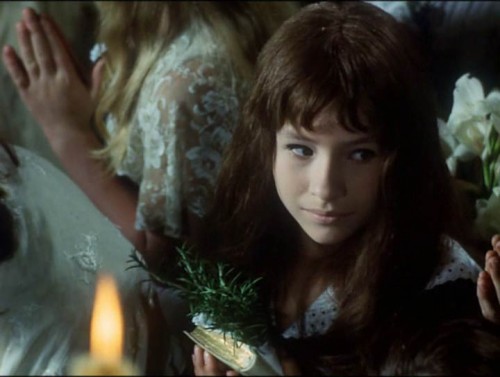Film
Valerie and Her Week of Wonders (reviewing films released some time ago)
Swallowing pearls, drinking chicken’s blood, fighting off creepy clergymen: these are among the many bizarre challenges our protagonist must endure in Valerie and Her Week of Wonders (Dir. Jaromil Jireš, 1970). Valerie, played by the beautiful Jaroslava Schallerova, is a 13 year old girl living with her grandmother in a small town where religion is paramount and old-time ideals are treasured. She spends her days practicing piano, attending church services, and having tea with her grandmother: all things seemingly ordinary for an obedient child. But beneath the pretty surface there is something rotten about this rustic Czechoslovakian hamlet. Vampires! Lecherous priests! Debauching actors in animal masks! And witch-hunting townspeople!
Like Lewis Carroll’s Alice, Valerie finds her reality altered magically and curiously into a strange and sometimes scary wonderland. The catalyst for the madness is the theft of Valerie’s prized possession, her mother’s pair of pearl earrings, by the Nosferatu-like ‘Weasel.’ Despite its surreal nature, Valerie is essentially a coming-of-age tale, an allegory of a pubescent girl encountering adult problems and figuring out whom she can and cannot trust. The symbolism for blossoming womanhood, cycles, youth, and renewals is purposefully obvious– fruits, buzzing nature, a bleeding daisy, a spilled glass of wine, a gushing fountain, drinking blood. The story is told as if in a dream, with a loosely sequential plot and disparate scenes cutting into each other. The cinematography reflects the story: the colors are alive and rich, but covered with a dreamy haze, almost dulling them, creating an atmosphere we see in our sleep and attempt to recall upon waking.
We walk along with Valerie as her dream unfolds, turning corners to find characters with shifting identities, never sure what to expect next. Is Eagle her brother or lover? Is the Weasel her father or a demon? Is her grandmother really her cousin? Valerie is in constant danger, combating evil forces with her innocence and kindness as she uncovers the mystery Eagle, who she is always saving from being tortured, has presented to her in secret letters. We don’t know why Valerie is the target of all these unusual happenings, but that is besides the point. Our duty as movie watchers is not to scrutinize or justify, but to let our senses take over and revel in the mesmerizing charm of the fairytale.
Director Jaromil Jireš, a key member of the Czech New Wave adapted the film with Ester Krumbachová from the novel Valerie and Her Week of Wonders by Vietslav Nezval, a poet, novelist, screenwriter, and principal founder of the Czech Surrealist Group. Nezval was known for his particular combination of surrealism and socialism, eschewing the mundane and predictable form of traditional narrative. In the forward to his novel, Nezval wrote: ‘I wrote this novel out of a love of the mystique in those ancient tales, superstitions and romances, printed in gothic script, which used to flit before my eyes and declined to convey to me their content.’
Valerie and Her Week of Wonders is characteristic of its creators’ work in its editing non sequiturs and experimental narrative and is considered one of the greatest achievements of Czech New Wave cinema. Made in 1970, two years after the Soviet Union invaded Czechoslovakia, Valerie is quite remarkable for the period, a time where cinema was made limited by the tyranny of communism. Jireš stays true to the form of Nezval’s novel, bypassing ordinary film-making to produce a higher art. Dreamlike imagery is used to show the mutability of beauty and horror, seduction and deception, working together in symbiosis. Dreams do not follow a formula, and neither does Valerie.
In the last scene, Valerie is in a sylvan setting, surrounded by the people of her town and being put to bed in a spirit not unlike a Bacchanalian ceremony. The film closes, Valerie is sleeping, beginning another cycle, and we are left with fuzzy memories.
Tags: czech new wave, Film, review


the seventies were the best decade for film. i need to check this flick out.
Definitely worth watching.